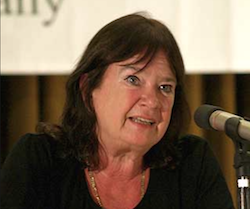Join Helga Zepp-LaRouche October 30, 11am Eastern/4pm CET in her Weekly Live dialogue and help usher in the Year of the New Paradigm for all Humanity. Send your questions, thoughts and reports to questions@schillerinstitute.org or ask them in the live stream.
In a Monday meeting, Oct. 28, held to evaluate the history-making events of last week—including the Oct. 22-24 Kazan, Russia BRICS summit; the Oct. 26 symposium/concert “Build a Chorus of Peace Against the Ghouls of War,” hosted by LaRouche Independent candidates Diane Sare and Jose Vega; and the Sunday, Oct. 27 “Operation DAWN, Threat of Nuclear War in the World Today” brunch, organized by former U.S. Marines intelligence officer and whistleblower Scott Ritter—Schiller Institute head Helga Zepp-LaRouche, both contributor to and participant in those events, and earlier processes that made the achievements of those events possible, indicated what she believed needed to happen next. “We have to absolutely make clear that the only way how the danger of a Third World War can be overcome, is that we have to get the collective West—that’s the United States and the European nations—to stop their silly geopolitical confrontation against this new majority of the world. After all, the BRICS (Brazil, Russia, India, China, South Africa, plus other nations) as they are now, represents 4.7 billion people, and 57% of the world’s population, and there are many more countries in line waiting to join. And it would be foolish, to the point of insanity, if the West would continue to oppose that.”
During last week’s Kazan BRICS conference, EIR correspondents in attendance had asked Russian advisor to host President Vladimir Putin, Anton Kobyakov, the question: Even if the BRICS is not anti-West, the West is currently anti-BRICS. If this does not change, we have the risk of nuclear war in the conflicts occurring in Ukraine and the Middle East, and a perpetuation of sanctions. Do you see the potential for activities and successes of the BRICS to change the outlook of the Anglo-American elites, to participate positively in developing a new security and development architecture, as proposed by Helga Zepp-LaRouche of the Schiller Institute?” Kobyakov had responded: “Indeed, we hope very much for that—that they will take part in hammering out, so to speak, peace initiatives. Our President talks about that, always. And we even have a nuclear deterrence strategy. The main thing is that Pax Americana, if it collapses—the main thing is that when they collapse, that they not bury all of us under the rubble.”
These are words that Americans should pay close attention to. The United States, presently on the verge of an expanding and potentially even a thermonuclear war with both Russia and China, is also on the eve of a November 5 Presidential electoral result, which will ultimately be unsatisfying, no matter which candidate wins. Two other candidates, neither of them running for the American Presidency—U.S. Senate independent candidate in New York Diane Sare, and Congressional independent candidate in the Bronx (CD15) Jose Vega—stepped into the Presidential policy vacuum, co-hosting a completely unique “international town meeting” on a new foreign and security policy. With its extraordinary set of experts, it focused, not on who is to blame, but rather, what citizens need to do, and what solutions to the present crisis must be made. In that context, the wars in Ukraine and Southwest Asia were addressed as tragic expressions of the lack of a higher perspective, and they identified the path to that higher perspective.
An international audience heard former American military officers of high rank, journalists, and even comedians, in dialogue among themselves, and with Helga Zepp-LaRouche. “These nations of the Global South are already the Global Majority, and they are determined to end the period of 500 years of colonialism, by building a new world economic system which will allow them to industrialize and overcome poverty and underdevelopment,” she said to the Saturday symposium. “They are building a great, New Development Bank of the Global South, a new Investment platform, a new BRICS grain exchange, and other institutions, which will help them to grow. It is the most urgent task for reestablishing world peace that the United States supports this effort. We must remember that the American War of Independence was the first anti-colonial war in history, by establishing independence of America from the British Empire.”
The Ten Principles for a New International Strategic and Development Architecture by Helga Zepp-LaRouche are not only a statement of principle, but a statement of intent, which, if adopted by people in the trans-Atlantic world, would supply the only means by which a collaboration with the nations of the Global South, and the Global Majority would ever be trusted, and therefore realized.
Join Helga Zepp-LaRouche October 30, 11am Eastern/4pm CET in her Weekly Live dialogue and help usher in the Year of the New Paradigm for all Humanity. Send your questions, thoughts and reports to questions@schillerinstitute.org or ask them in the live stream.


















